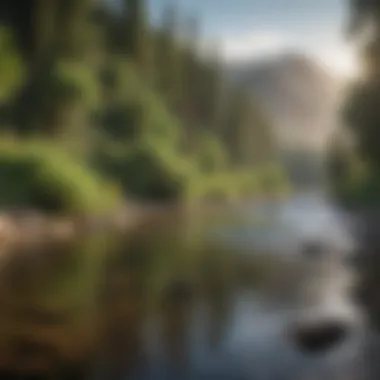Understanding the Dow Colorado Fishing License


Intro
The Dow Colorado fishing license represents a vital gateway for many individuals seeking to explore the freshwater landscapes of Colorado. Anglers need to understand the dynamics surrounding this license, which encompasses various aspects including its types, required documentation, and the intrinsic regulations that govern fishing practices in the state. Securing a fishing license is not merely a legal formality; it symbolizes a commitment to responsible engagement with nature and underscores the importance of sustainable fisheries management. This guide aims to systematically unpack the complexities associated with the Dow Colorado fishing license, offering clarity to both novice and seasoned anglers alike.
Obtaining a Dow Colorado fishing license involves a clear understanding of specific requirements. First, aspiring anglers must be aware of their residency status; different rates and regulations apply to residents and non-residents. Generally, residents enjoy reduced costs while non-residents face higher fees. Therefore, it is crucial to verify residency documentation before embarking on the registration process.
Types of Fishing Licenses
The fishing licenses offered by the Dow in Colorado are diverse. Among the available options, one can find:
- Annual licenses: Valid for a full calendar year.
- One-day licenses: Ideal for those wishing to indulge in a short fishing trip.
- Multi-day licenses: Feedback from users suggests these are popular for vacationers.
Each category serves its purpose, aligning with various fishing experiences while ensuring compliance with state regulations. The selection of an appropriate license depends on individual needs, frequency of fishing, and the targeted species.
Pricing
The financial aspect of acquiring a fishing license often plays a significant role in decision-making. Although prices may fluctuate from year to year, it's essential to consult the Colorado Parks and Wildlife website for the most accurate and updated pricing. Typically, licenses prices align with the type and duration of the license.
"Investment in a fishing license is an investment in conservation. It supports the maintenance of aquatic ecosystems and helps in preserving fish habitats for future generations."
Importance of Regulations in Fishing
Fishing regulations not only exist to protect aquatic species but also to promote responsible fishing practices. In Colorado, regulations can encompass size limits, bag limits, and designated seasons for certain species. These measures ensure that fish populations remain sustainable and contribute to the overall ecological balance.
Ecological Implications
Anglers must recognize the broader implications of their activities on the aquatic ecosystem. Recreational fishing can have significant effects on fish populations and their habitats. Through understanding regulations, anglers contribute to maintaining biodiversity and support fisheries management efforts initiated by local authorities.
Closure
Foreword to Fishing Regulations in Colorado
Fishing regulations in Colorado serve as a framework to maintain sustainable fishing practices and protect the state's diverse aquatic ecosystems. They outline the rules and requirements that ensure both conservation and recreational enjoyment for anglers. Understanding these regulations is crucial for anyone looking to fish in Colorado, whether they are experienced fishermen or newcomers to the sport.
The regulations focus on several key aspects. Firstly, they dictate licensing requirements, ensuring that all anglers possess valid licenses when fishing. This is essential for funding conservation efforts and maintaining fish populations. Secondly, regulations include bag limits, which control the number of fish an angler can catch, and size limits, which protect juvenile fish, allowing them to mature and contribute to the ecosystem. Additionally, seasonal restrictions may apply to certain species, ensuring that they can spawn without interference from fishing activities.
"To fish responsibly means to engage with nature in a way that does not undermine its integrity or sustainable future."
Another important consideration is understanding the local waterways, since fishing regulations can vary by county or specific body of water. Awareness of designated areas, prohibited zones, and specific management practices helps ensure compliance with state laws. Not only does this knowledge contribute to the health of aquatic ecosystems, but it also enhances the fishing experience by fostering a sense of responsibility and respect for the environment.
Overview of the Dow Colorado Fishing License
The Dow Colorado Fishing License is a crucial requirement for anyone wishing to engage in fishing within the state. Understanding this license helps potential anglers navigate the complexities of fishing regulations and conservation efforts in Colorado's waters. This overview will dissect the implications, necessity, and functionality of the fishing license, shedding light on its importance in preserving aquatic ecosystems while allowing recreational fishing.
Purpose of the License
The primary purpose of the Dow Colorado Fishing License is to regulate fishing activities across the state's diverse aquatic environments. Licensing ensures that all anglers comply with state laws, thereby contributing to the responsible management of natural resources. It prevents overfishing and promotes sustainable practices that help maintain healthy fish populations and ecosystems.
By obtaining this license, anglers demonstrate their commitment to environmental stewardship and compliance with laws designed to protect aquatic habitats.
Moreover, fees collected from the sale of fishing licenses contribute directly to conservation efforts, habitat restoration, and community educational programs. These funds play a significant role in supporting wildlife management, ensuring that fishing remains a viable activity for future generations.
Historical Background


The history of fishing regulation in Colorado dates back several decades, shaped by a combination of ecological needs and social interests. In the early 1900s, as recreational fishing gained popularity, authorities realized the necessity of instituting regulations to protect local fish stocks. The Dow Colorado Fishing License emerged as a formalized approach to managing and conserving these resources.
As more people began to explore Colorado's fishing opportunities, state legislation evolved to address various concerns related to sustainability and resource management. The Dow license was pivotal in unifying various local ordinances into a cohesive framework, making compliance simpler for anglers.
This evolution reflects a broader trend in environmental management, where recreational users are increasingly recognized as stakeholders in conservation efforts. The historical development of the fishing license correlates with increased awareness of ecological impacts and individual responsibility within the fishing community.
"Fishing licenses not only regulate the act of fishing but also embody a commitment to preserving nature's balance."
Types of Fishing Licenses Offered
Understanding the various types of fishing licenses is crucial for prospective anglers. The Dow Colorado Fishing License offers multiple options that cater to different needs and circumstances of fishers. Each license type is distinct and serves a specific purpose, making it easier for individuals to choose what fits them best. Here are the primary categories:
Annual Fishing License
The Annual Fishing License is designed for individuals who fish regularly throughout the year. It provides unfettered access to Colorado’s waters for an entire calendar year from the date of purchase. For those who have a passion for fishing, this option is not only convenient but also cost-effective compared to purchasing multiple short-term licenses. With the Annual Fishing License, the angler can enjoy the state's diverse fishing opportunities with a sense of peace regarding legal compliance.
Short-Term Fishing License
For casual fishers or those visiting Colorado, the Short-Term Fishing License is an ideal solution. This type of license is available for a limited duration, usually ranging from one day to several days. It allows visitors to experience the joy of fishing without a long-term commitment or investment. Individuals may find this beneficial during vacations or brief trips to the state's waters. However, it's important to note that those who fish more frequently may ultimately save money by opting for an annual license instead, depending on their fishing habits.
Special Licenses
Special Licenses encompass categories designed for specific demographics, allowing more individuals to engage in the activity of fishing. These include provisions for Veterans, Disabled Individuals, and Children. Each category aims to promote inclusivity in fishing, ensuring that everyone, regardless of their situation, can enjoy this pastime.
Veterans
Veterans can benefit significantly from special fishing licenses tailored for them. The unique aspect is the recognition of their service. The Colorado Parks and Wildlife often offers discounted rates or even free licenses to eligible veterans. This initiative not only encourages participation in fishing but also acknowledges the sacrifices made by these individuals. The prominent advantage is the accessibility it provides, enhancing recreational opportunities for those who have served the nation.
Disabled Individuals
For Disabled Individuals, the Dow Colorado Fishing license also includes special provisions that often grant reduced fees or even exemptions. This supports the principle of inclusivity, enabling all to engage in fishing activities. The key characteristic of this license is its design around the needs of individuals with disabilities. Fishing can be a therapeutic activity, and such accommodations encourage meaningful participation in outdoor recreational activities, improving overall well-being.
Children
Children's fishing licenses are another category worth noting. These licenses are typically free or come at a minimal cost. They are designed to introduce children to the joys of fishing at an early age. The key benefit of this license type is that it fosters a connection to nature and can enhance family bonding experiences. Additionally, encouraging fishing among youth promotes environmental stewardship from a young age, as they learn the importance of responsible fishing practices.
Cost of Licenses in Detail
The cost of fishing licenses in Colorado is a crucial topic for anyone looking to enjoy recreational fishing. Understanding the fee structure is essential, as it impacts the affordability and accessibility of these activities. Knowledge of costs helps potential anglers to budget effectively and consider possible types of licenses to purchase. Moreover, these costs contribute to vital conservation efforts and the sustainable management of the state's natural resources. Without these funds, the infrastructure and services necessary for maintaining healthy fisheries would struggle to survive.
Breakdown of Fees
To grasp the full impact of fishing license costs, it's important to examine the specifics of the fees involved. The pricing for licenses can vary based on several factors:
- Type of License: Costs differ for annual fishing licenses versus short-term options. An annual license provides the best value for frequent anglers, while short-term licenses allow flexibility for occasional fishing trips.
- Resident vs. Non-Resident: Fees are generally lower for Colorado residents compared to non-residents. This pricing strategy reflects the state's commitment to support its local fishing community.
- Age and Specific Special Licenses: Certain groups, such as veterans, disabled individuals, and youth, may have reduced fees. Understanding these nuances can lead to significant savings.
For example, a basic annual resident fishing license can cost around $36, while a non-resident may pay closer to $100 for a similar license. It indicates the state’s goal to incentivize local participation in fishing activities, fostering a connection between residents and their aquatic environments.
Available Discounts
In an effort to promote fishing among diverse populations, Colorado offers several discounts on fishing licenses. These include:
- Veterans: Many states, including Colorado, recognize the service of veterans by providing them with discounted or no-cost fishing licenses.
- Disabled Individuals: Reduced fees are available for persons with disabilities, making fishing more inclusive.
- Children: Young anglers often fish at reduced prices or may fish for free in certain age brackets, promoting early engagement with outdoor activities.


Additionally, promotions during certain times of the year, such as Free Fishing Days, allow individuals to fish without a license, fostering participation in this significant pastime. These discounts not only enhance accessibility but also encourage a sense of responsibility toward local ecosystems.
"Understanding the cost structure and available discounts for Colorado fishing licenses is essential for making informed decisions and engaging in responsible fishing practices."
By effectively communicating the costs and available discounts, this section ensures that readers can navigate the financial aspects of acquiring a fishing license while fostering an understanding of their contributions to state conservation initiatives.
How to Apply for a Dow Colorado Fishing License
Acquiring a Dow Colorado fishing license is a crucial step for anyone looking to engage in fishing activities within the state. This process enables anglers to comply with fishing regulations, which are essential for preserving aquatic ecosystems and ensuring that fisheries remain sustainable for future generations. Understanding how to navigate the application process not only promotes responsible fishing but also ensures that individuals support conservation efforts. This section outlines both the online and in-person application processes, detailing the specific steps, requirements, and essential considerations for each approach.
Online Application Process
The online application process for a Dow Colorado fishing license is designed for convenience and efficiency. Anyone can apply from the comfort of their home using the official Colorado Parks and Wildlife website. Here are the key steps involved in the online application:
- Visit the Official Website: Start by accessing the Colorado Parks and Wildlife site.
- Select the License Type: Navigate to the fishing license section and choose the type of license that suits your needs – annual, short-term, or special licenses.
- Create an Account: If you are a first-time applicant, you will need to create an account with relevant personal information.
- Fill Out the Application Form: Provide all required details, including your name, address, and any prior fishing license numbers if applicable.
- Payment: After completing the form, proceed to payment. Multiple payment options are available for ease of transaction.
- Confirmation: Once everything is processed, you will receive a confirmation, and your license will be emailed to you.
This method offers numerous benefits, such as saving time and reducing the need to travel to a physical location. It also provides immediate access to your license and official documents.
In-Person Application
Applying for a Dow Colorado fishing license in person may be preferable for some individuals, particularly those wanting to ask questions or get assistance from staff. Here are the steps to follow for an in-person application:
- Locate a Licensing Agent: Find the nearest Colorado Parks and Wildlife office or an authorized retail outlet that issues fishing licenses.
- Bring Required Documents: Make sure to have necessary identification, such as a driver’s license and any previous fishing licenses you may hold.
- Complete the Application Form: Fill out the application form available at the office. Staff can assist if you have any questions or need help.
- Pay the License Fee: Payment methods may vary; ensure you have cash or a card that the office accepts.
- Receive Your License: After processing, you will receive your fishing license immediately.
This option may involve waiting in line, but it also offers the advantage of personal interaction, which can enhance understanding of local regulations and conservation efforts. Both application methods are effective, ensuring that individuals can obtain their fishing licenses in a manner that best suits their preferences.
Regulations Governing Fishing in Colorado
Understanding the regulations that govern fishing in Colorado is essential for both sustainability and enjoyment for every angler. These regulations enforce guidelines that help preserve aquatic ecosystems and ensure fair access to these natural resources. They encompass various laws that dictate where, when, and how fishing can occur, and their compliance is not just mandatory but ethical.
State Fishing Laws
State fishing laws in Colorado are codified to manage fish populations effectively. These laws address several key points:
- License Requirements: It is illegal to fish without a valid Dow Colorado fishing license. This regulation ensures that all anglers contribute to preservation efforts through fees.
- Seasonal Regulations: Certain bodies of water have specific fishing seasons. For example, trout fishing may be allowed year-round in some lakes, yet have catch-and-release policies in certain rivers during specific times. This helps protect fish during spawning seasons.
- Addressing Limits: There are limits on the number of fish an angler can catch per day. These regulations prevent overfishing and help maintain fish populations for future generations.
Each law ties back to the broader goal of sustainable fishing. Violations of these laws can lead to penalties, including fines or loss of fishing privileges. Understanding and adhering to these laws is pivotal not only for personal accountability but also for the ecological health of Colorado's waters.
Conservation Measures
Conservation measures in Colorado are designed to promote ecological balance and protect the fragile aquatic environment. These measures include:
- Catch and Release Policies: Many waterways advocate catch and release practices to ensure species can thrive post-capture. This method minimizes mortality rates among fish released back into the wild.
- Habitat Restoration Projects: Various organizations and agencies work towards improving fishing habitats by rehabilitating shorelines and mitigating pollution. Support for such initiatives is vital for long-term fisheries health.
- Use of Eco-Friendly Gear: Regulations encourage anglers to use barbless hooks and biodegradable gear to reduce ecological impact.
"Sustainable fishing preserves both the natural habitats and the joy of angling for future generations."
By adhering to these conservation measures, anglers contribute to preserving the delicate aquatic ecosystems in Colorado. These efforts protect not only the species targeted by anglers but the entirety of the aquatic habitats.
Impact of Fishing on Aquatic Ecosystems
Fishing is a vital activity that not only serves recreational purposes but also has a significant impact on the ecosystems where it takes place. The balance of aquatic environments can be noticeably altered by fishing practices, which makes it essential to understand the various facets concerning these impacts. Proper management and responsible behavior are paramount to ensure sustainable interactions with fish populations and their habitats.
Sustainable Fishing Practices


Sustainable fishing practices aim to maintain fish populations at healthy levels while minimizing damage to marine ecosystems. This approach recognizes the necessity of balancing human activity with environmental preservation.
- Setting Limits: Authorities often impose limits on the size and number of fish that can be caught. This helps to ensure that fish populations can rebuild, contributing to long-term sustainability.
- Selective Fishing: Techniques like catch and release or the use of specific gear that reduces bycatch are becoming more common. These methods mitigate the impact of fishing on non-target species, preserving biodiversity.
- Monitoring Ecosystem Health: Continuous monitoring of fish stocks and aquatic habitats is crucial. Engaging in ongoing research allows stakeholders to adapt management strategies based on real data, ensuring that fishing practices evolve with the needs of the ecosystem.
Proper education and community involvement in conservation efforts are also vital. When the community understands the importance of sustainable practices, they are more likely to adopt them.
Effects of Overfishing
Overfishing represents one of the greatest challenges facing aquatic ecosystems worldwide. When fish are harvested faster than they can reproduce, the consequences can be dire.
- Decline in Fish Populations: Over time, species can become endangered or even extinct. This reduces biodiversity and disrupts the ecosystem's balance, affecting not just fish but also other species that rely on them for food.
- Ecosystem Disruption: The removal of large numbers of fish alters the food web. Predators may find it difficult to survive without prey, which can have a cascading effect on the entire aquatic ecosystem.
- Economic Consequences: Overfishing does not just threaten wildlife; it also jeopardizes economies that rely on fishing. Communities that depend on fishing for income face instability when fish populations dwindle.
In summary, the impact of fishing on aquatic ecosystems is multifaceted. Recognizing and addressing the relationship between human behavior and environmental health is essential for the longevity of both fish species and the ecosystems that support them.
"Sustainable practices not only protect marine life but also ensure that future generations can continue to enjoy the benefits of fishing."
Understanding these dynamics is critical for fostering responsible fishing practices and maintaining healthy aquatic environments.
Frequently Asked Questions
Frequently Asked Questions (FAQs) are essential to any article about the Dow Colorado fishing license. They provide clarity on common concerns faced by anglers, potential license applicants, and ecological enthusiasts. Through answering these queries, the article serves to demystify the sometimes complex fishing regulations and requirements of Colorado, allowing readers to engage more confidently with the subject.
Common Inquiries
There are several common inquiries that arise when discussing the Dow Colorado fishing license. One of the most frequent questions is about where to obtain the license. Licenses are available through the Colorado Parks and Wildlife website, various retail outlets, and select county offices.
Another common question is regarding the validity of the license. Many people ask whether a license acquired in another state will be honored in Colorado. Generally, a fishing license must be obtained specifically for Colorado, as licenses from other states do not transfer.
A question often posed is, "What are the fishing season dates?" Different areas in Colorado may have varied regulations regarding fishing seasons, with some waters open year-round and others subject to seasonal restrictions. It’s crucial for anglers to check specific regulations relevant to the water they wish to fish.
Clarifications on Regulations
Clarifying regulations surrounding the Dow Colorado fishing license is vital for maintaining compliance with state laws. One common regulation that raises questions is the existence of specific catch limits. Colorado has set various limits based on species, and it is important for anglers to understand these to contribute to sustainable fishing practices.
Additionally, anglers might inquire about licenses needed for different fishing methods. For instance, fly fishing, ice fishing, and catch-and-release fishing may have unique stipulations or requirements. Not understanding these nuances can lead to a frustrating experience.
In recent years, some concerns have arisen about the sale of live bait. Regulations have tightened, and anglers often need clear guidance on what types of bait are permissible and the rules surrounding their use.
Key Details to Remember
- Licenses must be purchased from official sources.
- Regulations often vary by region and species.
- Knowing local seasons and limits is essential for compliance.
It's vital for outdoor enthusiasts to stay informed about their region's specific fishing rules to protect our waterways and enjoyment of these natural resources.
By addressing these FAQs, this article aims to equip readers with the knowledge necessary to navigate the fishing experience in Colorado responsibly.
Closure
Summary of Key Points
Throughout this article, we have highlighted various aspects of the Dow Colorado fishing license:
- Types of Licenses: Different categories such as Annual, Short-Term, and Special Licenses cater to varied angler needs.
- Cost Insights: A detailed breakdown of fees and available discounts provides better financial perspective for potential buyers.
- Application Procedures: Both online and in-person methods ensure accessible options for obtaining a license.
- Regulations and Compliance: Awareness of state fishing laws and conservation measures is crucial for sustainable practices.
- Impact on Ecosystems: Recognizing fishing's effects on aquatic habitats reinforces the need for conscious angling.
This summary encapsulates the journey through fishing regulations, from acquisition to ecological responsibility.
Importance of Responsible Fishing
Responsible fishing is not just a guideline but a necessity. Engaging with the aquatic ecosystems of Colorado demands respect for the environment and its inhabitants. Responsible fishing practices contribute to the preservation of fish populations and aquatic health, ensuring that future generations can enjoy these resources.
The Dow Colorado fishing license ties anglers to this responsibility. It serves as a reminder that each fishing tackle or bait used influences both immediate and long-term ecosystem dynamics. Thus, understanding and adhering to regulations, promoting sustainable methods, and being mindful of unique habitat needs are fundamental to maintaining the integrity of Colorado's rich water bodies.















